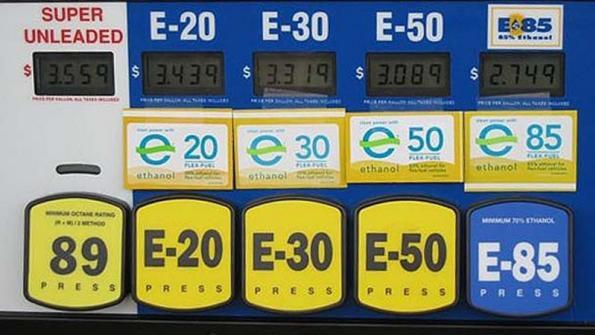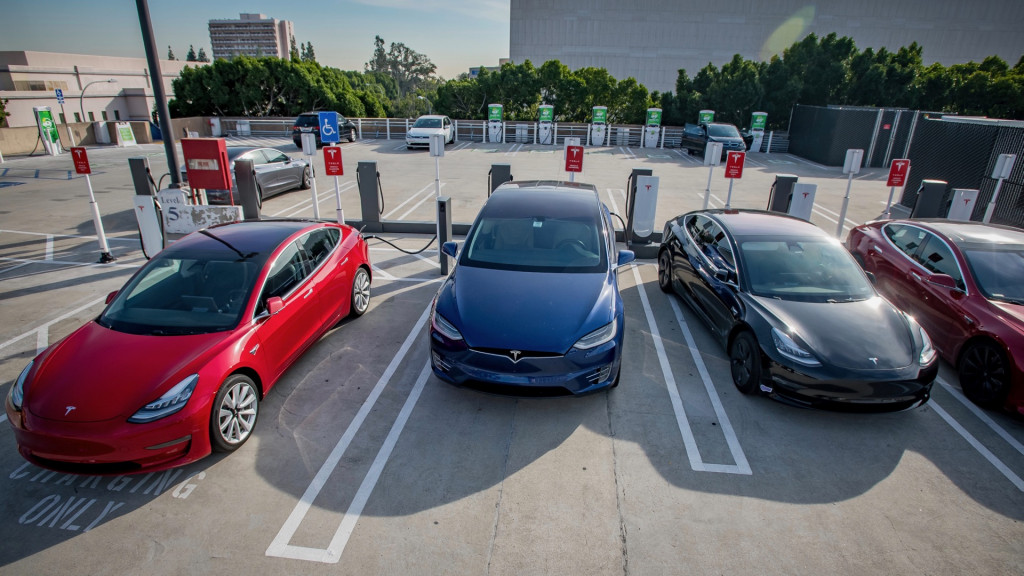Farmers are reportedly worried about the effect an accelerated transition to electric vehicles—such as California’s recently announced ban on gas-vehicle sales by 2035—might have on an already fragile U.S. market for corn ethanol.
The Trump administration funneled what the New York Times described Monday as “an extraordinary government bailout” to farmers amounting to $46 billion in subsidies and federal payouts ahead of Election Day—a move that may help farmers make up for losses from trade wars, uneven policy, and the pandemic.
The ethanol industry, once considered one of the most lucrative corners of the agricultural sector, had already been weathering a downturn since last year. Worries intensified in the pandemic, with cheap gas and an oil glut. Now a more aggressive shift to EVs suggests the possibility of a continued drop in the demand for corn ethanol, which is blended in pump gasoline.

Pump with multiple ethanol/gasoline blends.
Last year, the EPA lifted a summer ban that restricted the amount of ethanol to be used in gasoline for air quality and smog reasons, making E15 more widespread and theoretically increasing the use of ethanol. But state rules and costly retrofits actually kept it from getting to many stations—all as the ethanol industry has higher ethanol blends in sight.
The discretionary spending directly from the executive branch—quite a turnaround for Republicans who applauded Sarah Palin for calling for a halt to ethanol subsidies—might help brand Trump for the Corn Belt vote, as neither the people nor the messaging from the Trump administration have been uniformly pro-ethanol.
The current administration's position on ethanol has been inconsistent from the start. Despite campaign support voiced for the Renewable Fuel Standard in late 2016, some on Trump's transition team said he was opposed to ethanol, and confusion surrounded the administration’s actual position on the industry.
EPA administrator Scott Pruitt was a strong critic of the ethanol industry and its dependence on subsidies, and earlier in Trump’s term the EPA had studied cutting the amount of ethanol in gasoline.
When Pruitt stepped down, replaced by current administrator Andrew Wheeler, one outlet aptly called it a big win for Big Corn.

Marengo Charging Plaza, Pasadena, California
Realistically it will take until later in the decade for the more aggressive adoption of EVs to put a dent in the fuel use of California or any other state that signs onto the 2035 goal, which hasn’t yet been written into policy. While electric vehicles account for more than 5% of new-vehicle sales in California, they only make up about 1% of the statewide vehicle fleet, and there remain about 28 million vehicles with internal combustion engines in the state.
According to the U.S. Department of Energy, California used about 14.2 billion gallons of gasoline and about 2.7 billion gallons of diesel in 2018.
Without ethanol, 40 million barrels of additional oil would have been needed in 2016, and the U.S. net oil import dependence would have been 33% instead of 25%, says the Iowa Corn Promotion Board, cited by Fox News.
Meanwhile, former Vice President Joe Biden has made attempts to woo farmers. In the first (and potentially only) Presidential debate, Biden made clear that he doesn’t support the Green New Deal—although he did say that the plan would “pay for itself as we move forward.”
According to the U.S. Energy Information Administration, six states account for more than 70% of U.S. fuel ethanol production—Iowa, Nebraska, Illinois, Minnesota, Indiana, and South Dakota.

EIA - ethanol producing states
Congress is stepping up pre-election, too. Late last month, the Next Generation Fuels Act was introduced by Cheri Bustos (D, Illinois) to the U.S. House and would be very favorable to the ethanol industry.
Over the past several months, Biden has attacked Trump's record on ethanol. In August he issued a statement “promising his administration would "promote and advance renewable energy, ethanol, and other biofuels to help rural America and our nation’s farmers,” and the Washington Post has pointed out that Biden has actively played-up his commitment to ethanol in recent weeks.
Biden has proposed a more comprehensive set of EV incentives and tougher fuel economy regulations, but still sees a place for ethanol in gasoline, and even fracking, with what’s effectively a “yes” plan.













